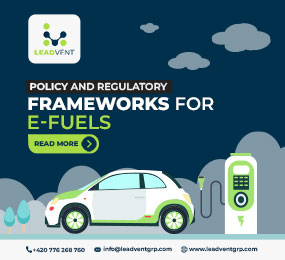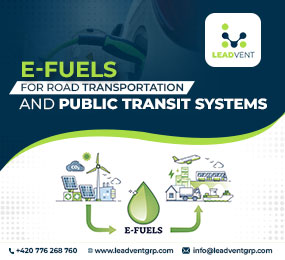Synthetic fuels produced from renewable energy sources are called E-fuels. They offer a potential solution to the increasing need for renewable energy. The use of e-fuels can be an alternative to conventional fossil fuels for transportation, which is one of the largest greenhouse gas emitters. These fuels assist in moderating both global warming and climate change as the earth moves towards a low-carbon future. This blog will discuss how e-fuels could shape various business functions in the future, as well as their benefits and potential within renewable energy.
What are E-Fuels?
E-fuel, also called synthetic fuels or power-to-X fuels, are produced using renewable energy through processes like power-to-gas or power-to-liquids technologies. These have chemical traits similar to traditional gasoline, diesel, and jet fuel, making them ideal for existing engines and infrastructure.
Benefits of E-Fuels
Environmental Sustainability
Emission reductions due to the production of e-fuel from renewables make it ideal. Their manufacture entails capturing carbon dioxide (CO2) from the atmosphere before combining it with hydrogen obtained via electrolysis using renewable electricity.
Compatibility with Existing Infrastructure
A key attribute associated with e-fuels is their ability to work with today’s transport systems where they can be used within current petrol-powered internal combustion engines thereby saving on expensive infrastructure changes.
Energy Security
By utilizing locally available renewable resources, e-fuels can reduce dependence on imported fossil fuels, enhancing energy security and stability.
E-Fuels in the Transportation Sector
Aviation
The aviation sector has made considerable efforts towards finding sustainable alternatives to conventional jet fuel including researching e-fuel as a possible option. Lufthansa alongside KLM have already started blending their jet fuel with some components of e-fuel therefore reducing emissions.
Shipping
The use of Maritime E-Fuels provides another avenue for change in this sector. With shipping companies looking at e-fuels for compliance with stringent international regulations that limit sulphur and greenhouse gas emissions, the shipping industry is changing rapidly. Fossil fuel alternatives to heavy fuel oil help reduce carbon dioxide while helping the shipping business to decarbonize.
Road Transportation
The use of E-Fuels can be easily fitted into the current fleet of internal combustion engine vehicles as a short-term measure to mitigate issues about pollution. Companies like Audi have started investing heavily in developing e-fuel technologies that would make their vehicles more sustainable.
E-Fuels in Other Industries
Power Generation
E-fuel acts as a reliable source of energy storage by addressing the intermittent nature of certain renewable energies such as wind and solar power plants thereby allowing them to generate electricity when there are low levels of renewable energy.
Industrial Applications
High-temperature processes required by industries such as steel, cement, chemicals, etc. could benefit from these fuels by providing necessary energy while cutting down on carbon emissions, resulting in sustainability targets met within the industries concerned.
Case Studies
Lufthansa’s E-Fuel Initiative
Some organizations have partnered with Lufthansa to develop and test aviation e-fuel. In one recent project, they were able to showcase the potential reduction of carbon emissions through blending jet fuel with components of e-fuel during commercial flights which would be useful in regulating greenhouse gas emissions associated with aircraft.
Audi’s E-Gas Project
With the e-gas project leading the way, Audi has been a driver of such renewable fuels. The organization can manufacture e-gas from renewable electricity and carbon dioxide for use as a fuel in its cars. This initiative by Audi has underlined that e-fuels can be integrated into the automotive sector.
FAQs
How are e-fuels produced?
E-fuels are made by tapping CO2 from the atmosphere and combining it with hydrogen which comes from electrolysis done through renewable electricity. The resultant synthetic fuel can have similar properties as fossil fuels.
Can e-fuel be used in existing engines?
It is appropriate to apply this type of fuel in present internal combustion engines without making many adjustments. Thus, they are a cheap way of reducing emissions across all modes of transportation.
What industries can benefit from using e-fuel?
Various sectors stand to gain more benefits from applying this kind of fuel; these include transportation (such as aviation, shipping, road transportation and public transit), power generation as well as industrial applications (including steel making, cement production and chemicals).
Conclusion
Additionally, the future holds great potential for using e-fuel within green energy systems because it offers a sustainable substitute for fossil fuels thus helping reduce global warming gas discharges thereby promoting a low-carbon future. Aside from transportation-related activities such as generating electricity and industrial processes other than manufacturing products like steel cement or chemicals which require their expertise for efficient output, there are some diverse uses for them.












